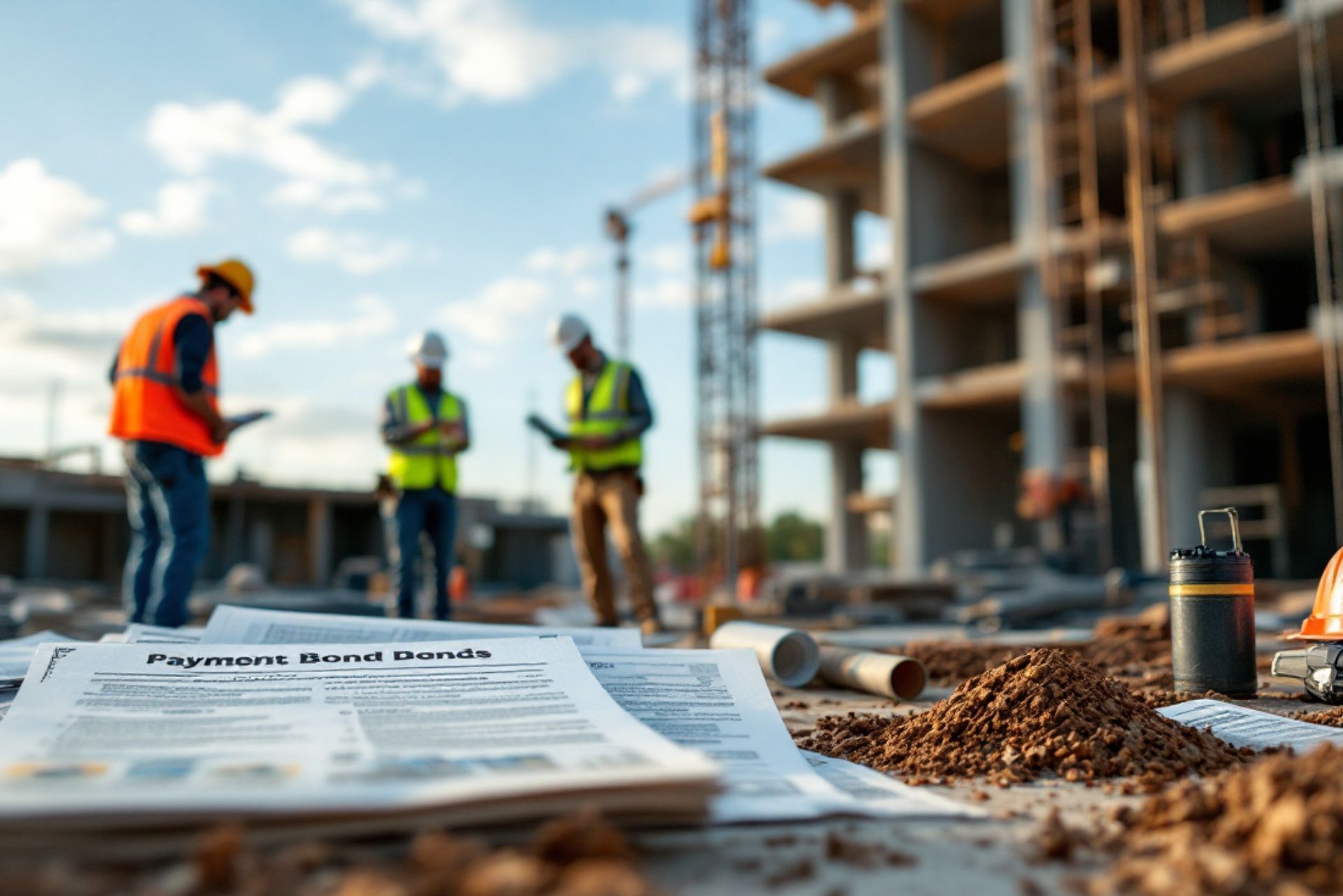
We're an independent insurance agency in Texas
Our experienced team offers services for both residential and commercial properties.With over 25 years of experience in the industry.
Contact Us
6600 Lyndon B Johnson Fwy Ste 220, Dallas, TX 75240, United States
(214) 253-0570
quotes@thephoenixinsurance.com
Working Hrs : 9.30am to 5.30pm

Most Common Business Policies
Index
Contact Us
In the realm of construction and contracting, understanding payment bonds is crucial for all stakeholders. This guide aims to provide a comprehensive overview of Texas payment bonds, covering their definition, importance, legal specifics, application processes, costs, risks, and protections involved. Whether you're a contractor, subcontractor, project owner, or simply someone interested in the construction industry, this guide will illuminate everything you need to know about Texas payment bonds.
Understanding Payment Bonds
Payment bonds are essential components in the construction industry. They serve as a guarantee that contractors will fulfill their payment obligations to subcontractors, laborers, and suppliers. This ensures that all parties involved receive their due payment for the services and materials provided.
Definition of Payment Bonds
A payment bond is a legally binding agreement between three parties: the project owner, the contractor, and the surety company. In essence, when a contractor is awarded a construction contract, they must obtain a payment bond to secure the project owner against potential non-payment issues. Should the contractor fail to pay any subcontractors or suppliers, the surety company is responsible for compensating the affected parties, ensuring that the project proceeds without financial disruptions.
Importance of Payment Bonds
The importance of payment bonds cannot be overstated. They not only protect those providing labor and materials, but they also enhance trust and credibility in the construction process. For project owners, payment bonds serve as a safeguard against financial risks associated with contractor defaults. For contractors, securing a payment bond can improve their reputation and increase their chances of winning bids, as it reflects a responsible business practice. In summary, payment bonds foster a stable construction environment, thus benefiting all parties involved.
How Payment Bonds Work
When a contractor applies for a payment bond, the surety company conducts a thorough assessment of the contractor's financial health, experience, and overall capability to complete the project. This evaluation process is crucial, as it helps ensure that only qualified contractors are backed by a bond. Once the bond is issued, it remains in effect for the duration of the project, providing ongoing protection. If a claim arises due to non-payment, the surety company steps in to investigate the situation and may cover the unpaid amounts, subsequently seeking reimbursement from the contractor. This mechanism not only protects the subcontractors and suppliers but also incentivizes contractors to maintain good financial practices throughout the project lifecycle.
Types of Payment Bonds
There are various types of payment bonds that cater to different needs within the construction sector. For instance, statutory payment bonds are often required by law for public projects, ensuring that all laborers and suppliers are compensated. On the other hand, commercial payment bonds are typically used in private sector projects and may have different stipulations based on the contract terms. Additionally, there are also subdivision bonds, which are specifically designed for developers who need to guarantee that infrastructure improvements will be completed and paid for. Understanding these different types of payment bonds can help stakeholders choose the right bond for their specific project requirements, ensuring adequate protection and compliance with legal obligations.

Texas Payment Bonds Explained
When it comes to payment bonds, Texas has its own set of regulations and stipulations that distinguish it from other states. Understanding these specifics is essential for anyone involved in the Texas construction industry.
Specifics of Texas Payment Bonds
In Texas, payment bonds are generally required for public construction projects exceeding a certain value, as defined by state law. These bonds ensure that all workers and suppliers are compensated, adhering to the state's commitment to promoting fair labor practices within the industry. Private projects may also request payment bonds, particularly if the project owner wishes to mitigate risks associated with contractor performance. This proactive approach not only fosters a more reliable construction environment but also enhances the overall quality of work, as contractors are more likely to prioritize timely payments to their subcontractors and suppliers.
Moreover, the requirement for payment bonds can vary depending on the type of project and its funding sources. For instance, federally funded projects may have additional bonding requirements that align with federal regulations, which can further complicate the landscape for contractors. Understanding these nuances is critical for contractors and subcontractors alike, as it can impact their bidding strategies and project management practices. Additionally, the presence of payment bonds can instill greater confidence among subcontractors, encouraging them to participate in projects knowing that their payment is secured.
Legal Requirements for Texas Payment Bonds
The legal framework surrounding payment bonds in Texas is robust. According to Texas Government Code, Title 10, a contractor must secure a payment bond before commencing work on public projects valued at over $100,000. The bond amount typically equals the total contract price. This ensures that all labor and materials supplied are protected under the bond, fulfilling the legal obligations to provide security for payment claims. Furthermore, the bond must be executed by a surety company that is authorized to do business in Texas, which adds another layer of assurance for all parties involved.
In addition to the bond requirements, Texas law mandates that contractors provide notice to their subcontractors and suppliers regarding the bond's existence and the rights it affords them. This transparency is crucial in maintaining trust and accountability within the construction process. If a contractor fails to secure the necessary payment bond, they may face significant legal repercussions, including the potential for project delays and financial liabilities. As such, understanding the legal landscape surrounding payment bonds is not only vital for compliance but also for the overall success of construction projects in Texas.
The Process of Obtaining Payment Bonds in Texas
The process of obtaining a payment bond in Texas involves several clear steps. Understanding these can make the procedure more straightforward for contractors seeking to protect their interests.
Preparing for the Application
Preparation is crucial when applying for a payment bond. Contractors should compile all necessary documentation, including their business financials, project details, and any past performance records. This information helps the surety company assess the contractor’s credibility and capability to fulfill their contractual obligations. Additionally, contractors should be aware of the specific requirements set forth by the surety company, as these can vary. It may be beneficial to consult with a bonding agent who can provide insights into the necessary documentation and help streamline the process. Having a well-organized portfolio not only facilitates a smoother application but also instills confidence in the surety company regarding the contractor's professionalism and reliability.
The Application Process
The application process typically begins with filling out a bond application form provided by the surety company. After submission, the surety will evaluate the contractor’s creditworthiness, experience, and financial stability. If approved, the contractor will receive a bond premium quote, which must be paid to finalize the bond issuance. This process can vary in duration, depending on the contractor’s profile and the specific surety company. It's important to note that the bond premium is often a percentage of the total bond amount, and factors such as the contractor's credit score and the nature of the project can influence this rate. Contractors should also be prepared for potential follow-up questions or requests for additional information from the surety, as these inquiries can help clarify any uncertainties and expedite the decision-making process. Understanding these nuances can significantly enhance a contractor's chances of securing the bond efficiently and effectively.
Costs Associated with Texas Payment Bonds
Understanding the costs associated with payment bonds is vital for contractors and project owners alike. These costs can vary based on multiple factors.
Factors Influencing the Cost
The cost of obtaining a payment bond in Texas is influenced by several factors, including:
- The contractor’s credit score and financial history
- The total contract amount
- The project's complexity and duration
- The contractor's industry experience and track record
A higher credit score typically results in lower premium rates, whereas a poor credit history may lead to increased costs. Understanding these factors can help contractors prepare adequately for the financial commitments associated with payment bonds. Additionally, the type of project can also play a significant role; for instance, public projects often have stricter bonding requirements, which can influence the overall cost. Contractors should also consider the potential for additional fees, such as those related to underwriting or administrative costs, which can further impact the final price of the bond.
Estimating Your Payment Bond Cost
On average, contractors can expect to pay between 1% to 3% of the total bond amount as a premium. For larger projects, this can translate to significant costs, so accurate estimation is crucial. Contractors can ask sureties for quotes based on their specific circumstances and incorporate these expenses into their project budgets to avoid surprises later on. It is also advisable for contractors to shop around and compare rates from different surety companies, as premiums can vary widely based on the surety's underwriting criteria and the contractor's profile. Furthermore, understanding the nuances of the bond market can empower contractors to negotiate better terms and potentially lower their costs, ensuring they remain competitive while safeguarding their financial interests.
Risks and Protections with Texas Payment Bonds
While payment bonds provide significant protections, they also carry certain risks. Both contractors and project owners should be aware of these to navigate potential challenges effectively.
Risks for Contractors and Subcontractors
For contractors, the primary risk is the financial obligation tied to the bond. If a claim is filed, the surety may demand reimbursement from the contractor, affecting their financial standing. Additionally, subcontractors who rely on payment bonds may face delays in payment if the bond process encounters issues or if a contractor disputes a claim. This can lead to strained relationships between contractors and subcontractors, as the latter may experience cash flow problems due to delayed payments. Furthermore, the administrative burden of managing bond claims can divert attention from project execution, potentially impacting overall project timelines and quality.
Protections for Project Owners
Project owners benefit from payment bonds as they provide a safety net against contractor defaults. In the event that a contractor fails to satisfy payment obligations, project owners can pursue claims against the bond, ensuring that the work is completed and financially compensated without undue delays. This protection encourages owners to invest in projects with greater confidence. Moreover, the presence of a payment bond can enhance the credibility of the contractor, as it indicates a level of financial stability and commitment to fulfilling contractual obligations. Owners can also leverage the bond as a negotiating tool, potentially leading to more favorable terms and conditions in their contracts, knowing they have a layer of security in place.

Frequently Asked Questions about Texas Payment Bonds
The intricacies of Texas payment bonds often raise various questions. Addressing these can clarify common doubts and misconceptions.
Common Misconceptions
One of the most common misconceptions is that a payment bond is the same as a performance bond. While both are surety bonds, a payment bond specifically ensures payment to subcontractors and suppliers, whereas a performance bond guarantees project completion according to the contract terms. Understanding this distinction is essential for effective risk management in construction projects. Additionally, many people believe that payment bonds are only required for public projects, but this is not the case. In Texas, private projects can also necessitate payment bonds, particularly when the contract amount exceeds a certain threshold. This requirement helps protect the rights of those who provide labor and materials, ensuring they receive compensation for their work.
Expert Answers to Your Questions
Experts frequently address questions regarding the necessity of payment bonds on private projects, the impact of credit history on bond eligibility, and the types of claims that can be made against a payment bond. Ensuring you have access to professional advice can aid in navigating the complexities associated with these bonds and enhance your project’s chances of success. Furthermore, it's important to note that the process of obtaining a payment bond can vary significantly based on the contractor's experience and financial standing. For instance, contractors with a strong credit history and proven track record may find it easier to secure favorable bond rates, while those with less experience may face higher premiums or additional requirements. Understanding these nuances can empower contractors and project owners to make informed decisions and foster better relationships with surety companies, ultimately leading to smoother project execution.
Conclusion: Navigating Texas Payment Bonds
In conclusion, Texas payment bonds are a vital mechanism within the construction industry that offers protections and mitigates risks for all parties involved. Understanding their significance, the application process, and the associated costs will help contractors and project owners navigate the construction landscape more effectively.
Recap of Key Points
Texas payment bonds require contractors to secure payments for labor and materials provided on construction projects. Understanding the specifics of these bonds, including legal requirements, costs, and the application process, is crucial for all stakeholders. Additionally, knowing the risks and protections associated with payment bonds can empower project owners and contractors alike.
Final Thoughts and Advice
As you embark on construction projects in Texas, consider the role of payment bonds in safeguarding your investments and ensuring smooth project execution. Seek legal and financial advice, and ensure you comply with all requirements to foster a successful and efficient construction environment.

